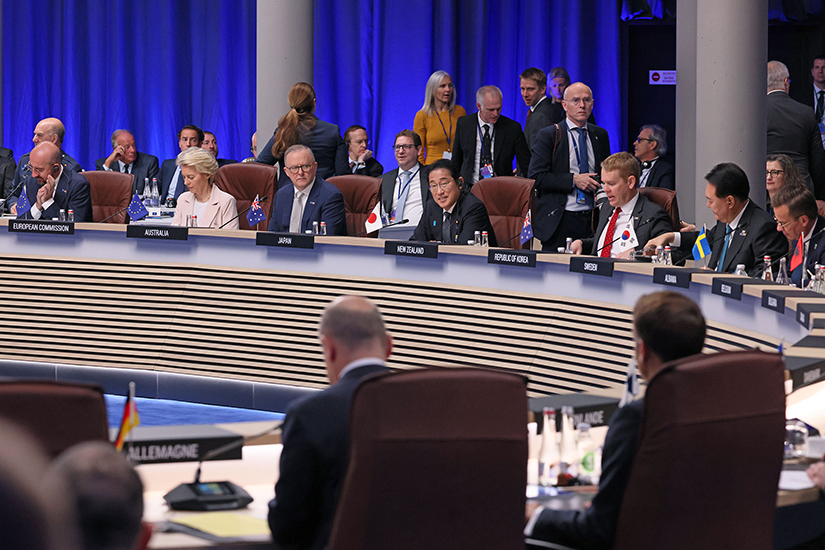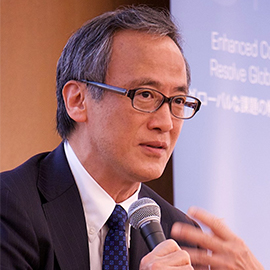On May 6, 2014, Prime Minister Abe, in his speech to the North Atlantic Council (NAC), expressed his commitment to a full-fledged strengthening of relations with NATO as a "Natural Partner" with which Japan shares fundamental values[1]. More than a decade later, PM Kishida would participate in the NATO summit meeting in Vilnius in July 2023, and agree to the "Individually Tailored Partnership Programme (ITPP)," a new cooperation document which will elevate Japan-NATO relations to a new level. The ITPP is an update of the general "Individual Partnership and Cooperation Programme (IPCP)" and is structured as a strategic framework for key partner countries to participate in activities with NATO, including workshops, joint training and exercises, capacity building, and political consultations. NATO regularly evaluates its liaison offices and liaison agreements with international organizations and partner countries, always considering the most appropriate forms of cooperation for both sides. What strategic significance does the Japan-NATO ITPP have in the increasingly challenging security environment in the Indo-Pacific, and will it demonstrate that Japan and NATO are "Natural Partners" in the true sense of the word?

Why is NATO so focused on Japan?
Since the end of the Cold War, NATO has continued to broaden its areas of interest and scope of activities to adapt to a new era in which international terrorism, cyber-attacks, and other asymmetric threats across the globe have both proliferated and diversified. In this context, NATO has hastened to redefine and reorganize the alliance, and has given priority to expanding its cooperative framework with the Middle East and the Mediterranean regions with which it has close relations. And now, with global attention focused on the security of the Indo-Pacific, including the issue of Taiwan, NATO, as a player in the region, appears to be seeking to deepen its engagement with the Indo-Pacific in pursuit of its interest in maintaining and sustaining the alliance.
What is behind this?
In June 2023, NATO Secretary General Stoltenberg voiced strong alarm over the recent deepening of ties between China and Russia, which has lead them to “increase their presence”, and to engage in more military activities[2]. As a regional alliance, NATO officials have taken care to avoid explicit reference to the possibility of directly intervening in conflicts in other regions, but nonetheless have strongly indicated their deep concerns over the global consequences of a Taiwan contingency[3]. The root of these concerns lie in China and Russia’s deepening military ties, which has lead some to believe that Russia's attempt to change the status quo by force in Ukraine could be echoed in East Asia by China against Taiwan.If it should succeed, there would be an increased possibility of a chain reaction of similar situations occurring in other regions of the world. As global interdependence becomes the norm and threats grow in new domains such as cyber and outer space, it is natural for NATO to work closely not only with partners within regional boundaries, but ones around the world, to maintain its cohesiveness as an alliance. In particular, as current global threats such as cyber attacks and disinformation-based cognitive attacks have so palpably transcended borders and regions, NATO has been forced to urgently build stronger partnerships to address them.
Strengthening the Japan-NATO Partnership with a Focus on Economic Security
The impacts of the Vilnius summit will be manifold. In the short term, it will lead to operational cooperation in new domains such as space, cyber, and disinformation. In the medium term, we will see joint efforts in research and development into Emerging and Disruptive Technologies (EDTs), and in the long term, there will be partnership and coordination in global issues such as climate change and large-scale infectious diseases. In addition to this, the lessons learned from the recent invasion of Ukraine are likely to lead to a focus on improving interoperability and ensuring sustainable supply chains through joint development[4]. Although at first glance, these items may appear to be separate projects, they are all organically connected, and it appears that NATO is positioning the ITPP as a means of not only strengthening relations with Japan, but also of ensuring sustainable development as an alliance.
Since 2008, NATO has focused its efforts on addressing energy security and climate change impacts as long-term, strategic goals. The reason for this is that NATO views addressing these global challenges as part of the alliance's transformation and as a lever of change for its survival[5]. However, the global spread of the novel coronavirus (COVID-19) and Russia's invasion of Ukraine have highlighted NATO’s economic and security vulnerabilities, and have made the alliance aware of the urgent need to address these new challenges. Specifically, it has sparked a realization among the alliance that it must regain its military and industrial capabilities to deal with the challenges of a high-intensity war scenario, as its ammunition and supply stocks have continued to shrink after the Cold War, and that the recovery from the wildly unexpected disruptions to the global supply chain must be hastened. In other words, NATO was confronted with the growing vulnerability of its civilian infrastructure, a large point of concern due to its foundational relationship to the military, and thus the need to strengthen its resilience.
In invading Ukraine, Russia used energy (oil and gas) as a diplomatic bargaining chip, resulting in not only disruptions due to changes in energy suppliers, but also instability in global food supply and delays in addressing the effects of climate change. Having had to respond suddenly to the national vulnerabilities that surfaced due to an overreliance on Russia for energy, NATO member states have learned from this experience and are moving to secure stable supplies of critical strategic commodities such as energy and rare earths. As an approach to solving this problem, it is considered extremely important not only to find new suppliers, but also to eliminate hybrid threats originating from new domains such as cyberspace and outer space, and to build an equipment system that is not overly dependent on rare earths by introducing advanced technologies. Furthermore, expanding interoperability through joint development is a necessary goal to expediently address common global challenges, and is consistent with the policy direction of NATO's alliance strategy.

In fact, it could be taken as a political and economic imperative for NATO to hurry to strengthen relations with Japan, in order to ensure that the areas of cooperation outlined in the ITPP are able to organically interact with each other and thereby reduce the likelihood of negative consequences escalating from military challenges. In particular, Secretary-General Stoltenberg's warning against the West's overreliance on China for rare earths may also be motivated by a desire to address the economic security challenges inherent in the rare earths supply chain affecting the expansion and strengthening of NATO’s global partnerships[6].
Establishment of Center of Excellence of NATO in Japan
Japan is a West-aligned nation that shares in the West’s commitment not to accept any change in the status quo by force or coercion, and furthermore acts as an important player in ensuring peace and stability in East Asia. It is only natural, then, that it should strengthen its security presence in the Indo-Pacific region by enhancing cooperation with NATO, as well as with European countries. However, it is not enough to simply establish a NATO liaison office in Tokyo[7]. Furthermore, it is important to improve Japan's global strategic communication capabilities and persistently issue security messages from the Asia-Pacific in order to demonstrate their relevance to the security interests of countries outside the region.
To this end, I propose hereto build on the opportunity presented by the Japan-NATO ITPP as "Natural Partners,” by establishing an "Indo-Pacific Center for Regional Studies (IPCRS)" in Japan as a public-private cross-sector "Center Of Excellence" (COE) in addition to the NATO Liaison Office in Japan. It would be expected to serve as a center for sharing and disseminating information to countries outside the region by bringing together researchers and practitioners from the public and private sectors in the Indo-Pacific region, including East Asia, Southeast Asia, the South Pacific, and South Asia. Already, NATO has also established nearly 30 COEs under the management of the Allied Command Transformation (ACT) to accelerate transformation, and has established a support structure specializing in various research themes ranging from operational management to global issues[8]. These COEs are not directly under NATO, but are managed by each member country on its own initiative, and they are also active in research cooperation with non-member countries.
If Japan establishes an IPCRS as a center for comprehensive cross-disciplinary research in the Indo-Pacific region, this will not only lead to better operational cooperation between Japan and NATO, but also to direct support for the transformation that ACT is pursuing as NATO's "Natural Partner”. Specifically, the content of close and continuous support could include (1) Cooperation on research and other aspects of dual-use technology, (2) Dissemination of information on cognitive warfare and cyber warfare, and (3) Economic security related to supply chains, semiconductors, and other sensitive technologies. In addition, independent research institutes are currently located under the Pentagon, generally for each U.S. regional command, and act as bases for research and other support to the U.S. military[9]. If the IPCRS can collaborate with the Asia Pacific Center for Security Studies (DKI APCSS), which mainly supports Indo-Pacific Command in research, training, and education, it can be expected to, through the sharing of information, realize NATO support for Japan’s security through the Japan-U.S. alliance. In addition to conventional equipment cooperation and capacity-building support, increasing the IPCRS's presence in the Indo-Pacific region through the sharing of soft powers such as information and communication would not only strengthen Japan-NATO relations, but would also be beneficial to Japan's diplomacy and security.

(2023/08/01)
Notes
- 1 “Japan and NATO As “Natural Partners” Speech by H.E. Mr. Shinzo Abe, Prime Minister of Japan, at the North Atlantic Council”, May 6, 2014.
- 2 NATO, “Remarks by NATO Secretary General Jens Stoltenberg at the 2023 NATO Youth Summit,” June 5, 2023.
- 3 NATO, “ Speech by NATO Secretary General Jens Stoltenberg at the Day of Industry, organised by the Federation of German Industries,” June 19, 2023.
- 4 Individually Tailored Partnership Programme between NATO and Japan for 2023 – 2026,”July 12, 2023.
- 5 NATO, “NATO Secretary General: our armed forces must be both green and strong,” June 21, 2023.
- 6 NATO, “Remarks by NATO Secretary General Jens Stoltenberg at the CHEY Institute during his visit to the Republic of Korea,” January 30, 2023.
- 7 Discussions on the NATO Liaison Office have been ongoing at the North Atlantic Council (NAC) since Secretary General Stoltenberg's visit to Japan in January 2023, but French opposition has prevented a consensus from being reached within the Alliance, so discussions will continue.
NATO,“Closing press conference by NATO Secretary General Jens Stoltenberg at the end of the 2023 NATO Summit in Vilnius,” July 13, 2023.
However, France has traditionally sought to develop its own foreign policy strategy distinct from the rest of Europe under the slogan of strategic autonomy, and has repeatedly checked against NATO, of which North American countries are members. If the opposition to the NATO Liaison Office is part of this trend, there is a strong possibility that the NAC will turn in favor of it through future discussions. It is advisable to keep a watchful eye on the situation.Elisabeth Koch, “European Strategic Autonomy after Macron’s Trip to China,” May 9, 2023. - 8 NATO, “Centres of Excellence,” December 06, 2022.
- 9 European Command: George C. Marshall Center; Indo-Pacific Coomand: Asia-Pacific Center for Security Studies (DKI APCSS); Africa Command: Africa Center for Strategic Studies; Central Command: Center for Near East and Southeast Asia Strategic Studies, etc.

